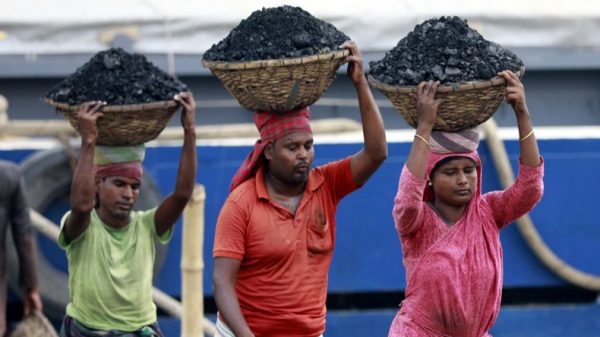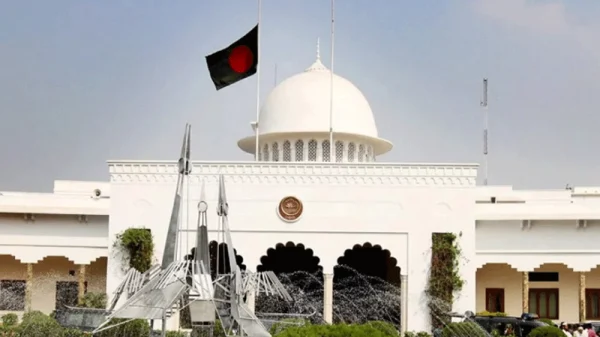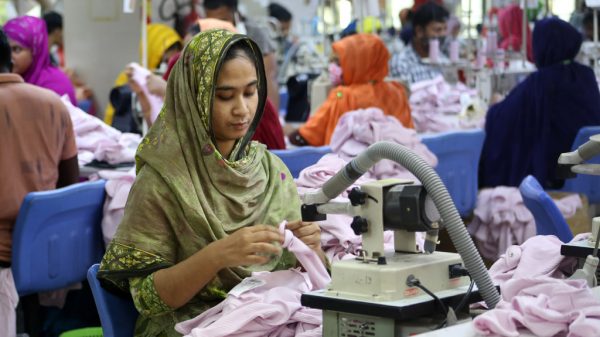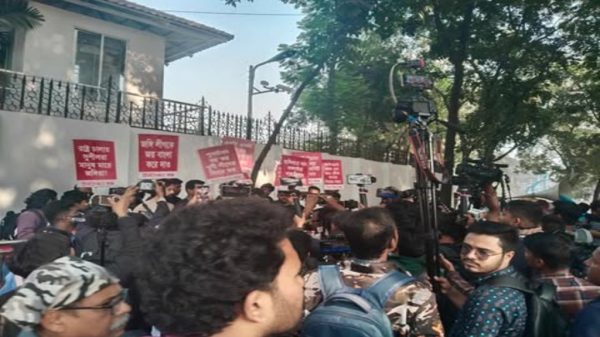Inequitable, low wages continue to hit workers

Shawdesh Desk:
Workers in Bangladesh suffer discriminatory wages due to the lack of a national minimum wage standard, trade union leaders and labour rights advocates said.
According to them, the prevailing wage-setting system in the country is discriminatory and against the interest of workers.
The May Day movement, trade union leaders said, was for an eight-hour workday with fair wages but the demand is yet to be fulfilled in Bangladesh.
Without ensuring fair wages for workers, an eight-hour workday is meaningless, they viewed.
Labour rights activists demanded a ‘permanent wage board’ and national minimum wages for the workers to eliminate wage discrimination in different sectors of the country.
According to government data, there exist a total of 44 industrial sectors in the country in which wages for workers are set under a ‘minimum wage board’ for each sector, formed by the labour ministry.
Meanwhile, the inflationary pressure has been affecting all workers in the country indiscriminately.
Of the 44 industrial sectors, two were included in the minimum wage board for the first time in 2023, while the minimum monthly wage in the rest of the sectors ranges from Tk 792 to Tk 16,000.
The minimum monthly wage for petrol pump workers was set at Tk 792 in 1987 and no review and revision of the wage has been made ever since.
According to petrol pump sector owners, although the minimum wage has not been reviewed officially in the past 36 years, workers in the sector receive much higher than the amount determined in 1987.
Although there is a provision in the Labour Act to review minimum wages in every five years, the rule remains to be implemented in 20 sectors for more than five years, government data showed.
Trade Union Centre general secretary Wajed-ul Islam Khan termed the existing wage determination process discriminatory.
He said that while workers in the readymade garment sector were getting Tk 8,000 as the minimum wage those in many
sectors were receiving Tk 4,500–Tk 6,000 as the lowest wage.
Wajed said that an inhuman situation was prevailing i n the tea garden as a worker in the sector received only Tk 170 per day.
Besides, he said, workers in informal sectors face serious challenges in surviving with very low wages.
Workers are being deprived of fair wages due to the lack of a permanent wage commission and national minimum wages, said Wajed.
He said that workers in various sectors were receiving wages in various amounts but the inflationary pressure was equally affecting them.
Wajed demanded dearness allowance for workers so that they could cope with the inflationary pressure.
Samajtantrik Sramik Front general secretary Razekuzzaman Ratan said that the uprising of workers at Hay Market in Chicago in 1886 was for an eight-hour workday with fair wages.
Workers in Bangladesh remain far from receiving a wage that is minimum for living and ensuring an eight-hour workday without fair wages is meaningless, he said.
Claiming that worker wages in Bangladesh are among the lowest in the world, he observed that the rate of people gaining quick wealth in the country was among the highest.
Ratan alleged that neither any global nor any local standard was followed in setting minimum wages for workers in Bangladesh.
Pointing out that some 90 per cent of the country’s total 7.34 crore workers are engaged in the informal sector, he said that they were being deprived of reasonable wages due to that lack of national minimum wages.
The prevailing wage-setting system in the country is rather widening the inequality through squeezing worker rights and ensuring benefits to the owners, Ratan observed.
Regarding wages of tea garden workers, he said that it was a tragedy that a worker was getting Tk 170 a day in the tea garden industry which became 170 years old now.
‘The tea garden workers are forced to do “wage slavery” as they have no alternative,’ Ratan further observed.
The wage of a tea garden worker should be, he went on to say, at least Tk 500 a day.
Former general secretary of the Bangladesh Tea Workers Association Rambhajan Koiri said that wages of tea garden workers were much lower than those in other industrial sectors.
‘Tea garden workers staged demonstrations in August 2022 for a higher wage as a revision of their wage for 2021–22 was pending. Following the movement, the government raised their wage to Tk 170 a day from Tk 120, but their other facilities were not improved,’ he said.
Rambhajan claimed that the Tk 170 daily wage was announced by the government for 2021–22 but the wage board and owners were trying to keep the wage unchanged for 2023 as well.
‘I was the representative of the workers to the wage board and I stepped down from the board in August 2022 as the board did not accept any proposal placed by workers,’ he said.
After Rambhajan resigned, the labour ministry appended Bangladesh Tea Workers Union vice-president Pankaj Kando as the workers’ representative to the board.
Pankaj has, too, recently resigned from the board as the demands of workers were not honoured by it.
A recent survey by the Asia Floor Wage Alliance found that the total expenditure of a readymade garment worker family was higher than its income, even when there were two earners in the family working in the RMG industry.
On average, the total expenditure of an apparel worker family was Tk 24,373, with food accounting for about 44 per cent of the spending and non-food items for about 56 per cent.
Against the expenditures, the combined actual income of two workers was Tk 21,642, it said.
The survey found that the food consumption by an apparel worker was 1,950 Kcal at Tk 120 a day, which was significantly lower than the poverty-line food consumption standard of 2,122 Kcal, defined by the government’s Household Income and Expenditure Survey in 2016.
‘It is of grave concern that garment workers, engaged in hard and long physical labour, are consuming less food than the poverty-level caloric standard set by the Bangladesh government. This inadequate food intake undermines the health and safety of workers and their families,’ the alliance said in a recent statement.
AFWA Bangladesh supports garment workers and their unions in their demand for an increased minimum wage at Tk 22,000–Tk 24,000 as insufficient wages harm a worker’s well-being and ultimately the entire family’s well-being, the statement said.























Leave a Reply